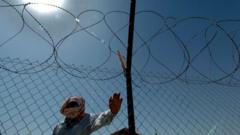This latest trial follows a mistrial earlier this year, where jurors were unable to reach a consensus. During the proceedings, the jury heard from the plaintiffs themselves, recounting horrific experiences they endured at the hands of their captors, including the humiliation of forced nudity. CACI, which supplied interrogators to the military at Abu Ghraib, maintained that its personnel were not involved in the acts of abuse perpetrated by military police. Nonetheless, the jury concluded that CACI was complicit since the interrogators had directed military personnel to "soften up" detainees for questioning.
Following the verdict, CACI expressed disappointment, portraying itself as a scapegoat, claiming that no employees faced criminal or civil charges related to these events. This decision marks a critical turning point as it represents the first instance where a civilian contractor has faced legal consequences for complicity in the treatment of detainees at Abu Ghraib. Each of the plaintiffs received $3 million in compensatory damages and $11 million in punitive damages, further emphasizing the severity of their experiences and the court’s commitment to addressing historical injustices.
"I’ve waited a long time for this day," stated Mr. al-Ejaili following the verdict, indicating the case's broader implications for accountability in military and contracting practices. The revelation of gruesome photographs from Abu Ghraib in 2004 sparked global outrage and condemnation, leading to the conviction of eleven US soldiers for various military offenses, although their sentences were relatively lenient. The enduring legal repercussions of Abu Ghraib continue to highlight the critical discourse surrounding human rights and accountability within military operations.
Following the verdict, CACI expressed disappointment, portraying itself as a scapegoat, claiming that no employees faced criminal or civil charges related to these events. This decision marks a critical turning point as it represents the first instance where a civilian contractor has faced legal consequences for complicity in the treatment of detainees at Abu Ghraib. Each of the plaintiffs received $3 million in compensatory damages and $11 million in punitive damages, further emphasizing the severity of their experiences and the court’s commitment to addressing historical injustices.
"I’ve waited a long time for this day," stated Mr. al-Ejaili following the verdict, indicating the case's broader implications for accountability in military and contracting practices. The revelation of gruesome photographs from Abu Ghraib in 2004 sparked global outrage and condemnation, leading to the conviction of eleven US soldiers for various military offenses, although their sentences were relatively lenient. The enduring legal repercussions of Abu Ghraib continue to highlight the critical discourse surrounding human rights and accountability within military operations.



















